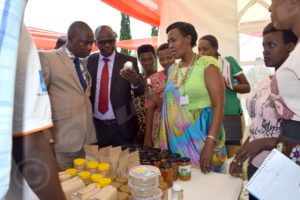
Economic operators displaying their products in the trade fair
Flour, maize, fruits, sunflower oil, banana wine, juice, rice, coffee… are some of the agricultural products exhibited in a three-day trade fair being held in the capital Bujumbura on the occasion of the week of the agro-food promotion. Some of the products are yet to be certified by Burundi Office of Standardization and Quality Control (BBN).
Jeanne Sabukumi, Director of “Girumugisha” factory processing agricultural products from fruits, legumes and medicinal plants, says her products are still waiting for the certification by BBN. “The standardization office is aware of our activities and has samples of our products,” says Sabukumi. She also says she has no fear about the seizure of her products by the local administration. “We do not work in secret places, we always work transparently”, she says. Sabukumi hopes that, at any time, her products will be certified as they meet all required standards.
Jean Paul Nzosaba, Coordinator of the AgriProFocus Network which organized the trade fair, says the network helps agricultural producers be informed about the documents required by BBN to have their products certified. “We are aware that some of the products sold do not meet the required conditions. We sensitize them to the criteria and the procedures for their products to be certified”, he says.
Aimable Nkunzumwami, Assistant to the Minister of Trade, Post, Industry and Tourism, says the unauthorized production is a handicap to the promotion of the agricultural products. “They couldn’t enlarge their markets worldwide”, he says. Nkunzumwami called upon all economic operators to proceed with BBN certification; otherwise, restrictive measures should be imposed.
Placide Nduwamahoro, Head of certification service at BBN, says all economic operators must bring their products to be certified before being sold on markets. “We must ensure that all required standards are met. Otherwise, the local administration and police should seize their products”, he says. He, however, says the certification process would be delayed due to power cut, shortage of reagents and insufficient equipment and staff.



















 IWACU Open Data
IWACU Open Data

